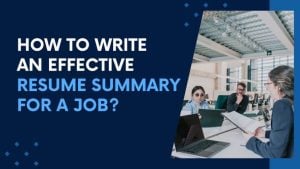Resume Writing Tips for International Students
 Publié le 11 March 2025
Publié le 11 March 2025
Find the right job to support your studies with resume writing tips for international students with limited work experience.
For international students with limited work experience, creating a resume that stands out might seem like a tough hill to climb.
This common struggle can make it hard to feel confident about presenting oneself to potential employers. Nevertheless, international students need to be willing to find good work opportunities that will provide support and experience while focusing on learning.
In this blog, we’re going to dive into some helpful resume writing tips for international students that will show you how to craft a resume that shines, even if you have limited experience in your work history.
Showcase Your Educational Milestones
In crafting a compelling international student resume, it’s important to show any specific skills, abilities, experiences, educational milestones, and other keywords as 63% of HR managers prioritize resumes tailored to the open position. Do not shy away from addressing your status as a student on your resume. Crafting a resume and a cover letter that promotes your academic experience can highlight the valuable skills you gained during your education.
Selecting the most effective form for your resume and cover letter also has a large impact. As an international student with limited work experience, you need to choose the one which highlights your credentials in the best possible way.
What to Include:
- Degrees and Relevant Courses: List your highest degrees and any courses directly relevant to the job.
- Academic Honors: Include awards or recognitions like scholarships or making the Dean’s list.
- Key Projects: Mention significant academic projects or research that showcase relevant skills.
- GPA (if strong): Share your GPA if it’s particularly high and relevant to the field.
- Certifications: Add any additional certifications or completed training programs.
How to Include Them:
- Start with the Latest: Begin with your most recent educational experience and go backwards.
- Clear Formatting: Use bullet points for easy reading and quick scanning.
- Keep it Short: Stick to the essentials like the name of the institution, degree, and dates.
- Quantify: Use numbers to highlight the scale or impact of your achievements.
- Align with Job Needs: Make sure your education section matches the job’s requirements.
Things to Avoid:
- Don’t list every class or minor award – keep it relevant.
- Skip courses that don’t apply to the job you’re targeting.
- Always be truthful about your educational background.
Showcase Your Soft Skills
Highlighting soft skills is an essential resume writing tip for international students with limited work experience. These are transferable skills that you bring with you into any workplace, including communication, collaboration and interpersonal skills. These display how you will be a valuable member of the team from day one, as you learn the particulars of your new role.
What to Include:
- Communication: Emphasize your ability to communicate well in diverse settings like your student housing in New York city or London.
- Adaptability: Highlight your skill in adjusting to new environments and challenges.
- Problem-Solving: Show your ability to think critically and solve problems.
- Team Collaboration: Demonstrate your experience working effectively in team settings.
- Cultural Sensitivity: Indicate your understanding and respect for different cultural perspectives.
How to Include Them:
- Real Examples: Use specific examples from your academic or volunteer experiences to illustrate your soft skills.
- Incorporate in Experiences: Blend your soft skills into the descriptions of your educational and project involvements.
- Quantify: Where possible, use numbers to show the effect of your soft skills.
- Align with Job Needs: Customize your soft skills to match the requirements listed in the job description.
- Focus on Relevance: Concentrate on the soft skills that are most relevant to the job you’re applying for.
Things to Avoid:
- Avoid making big claims about your skills without concrete examples.
- Don’t be overwhelmed by listing every soft skill; choose the most relevant ones.
- Stay away from overused terms like “team player” or “hard worker” unless you provide specific examples.
Showcase Projects and Volunteer Work
Including projects and volunteer work is beneficia for all job seekers, including international students with limited work experience. Deloitte’s Volunteerism Survey indicates such experiences can improve leadership skills and have other benefits, making job candidates more attractive to employers.
What to Include:
- Relevant Projects: Include academic or personal projects that demonstrate relevant skills.
- Volunteer Roles: Highlight any volunteer positions, particularly those showing leadership or teamwork.
- Achievements in Projects: Mention any notable accomplishments or recognitions in your projects.
- Skills Gained: Identify specific skills or experiences gained from these activities.
- Duration and Scope: Provide a timeframe and a brief description of the project or volunteer work’s scope.
How to Include Them:
- Prioritize Relevance: List projects and volunteer work that are most relevant to the job first. You can also include examples of any volunteer work that you did during your education.
- Be Specific: Give details about what you did and what you achieved.
- Use Action Words: Start descriptions with action verbs to make them more dynamic.
- Quantify: Where possible, use numbers to illustrate the impact or scale of your work.
- Integrate Soft Skills: Show how these experiences helped you develop soft skills.
Things to Avoid:
- Don’t include projects or volunteer work that doesn’t add value to your job application.
- Avoid general descriptions; be specific about your role and contributions.
- Don’t let this section overshadow your other qualifications. Keep it balanced.
The Importance of Proofreading and Feedback
The importance of proofreading and feedback is one of the most important resume writing tips for international students that cannot be overstated, especially when stepping into a competitive job market.
A study by CareerBuilder found that 58% of resumes have typos, and such errors can be a major turn-off for employers. For example, a simple mistake like misspelling ‘management’ as ‘mangement’ can signal a lack of attention to detail.
Culturally different resume standards can also lead to misunderstandings; what’s common in one country might be unusual in another. For example, including a photo on a resume is standard in many European countries, but it’s often discouraged in the United States.
Seeking feedback is equally important. A fresh pair of eyes can catch errors you might have missed and provide perspective on how your resume might be perceived by the employers.
According to a survey by Zety, resumes that are reviewed and polished by others are 43% more likely to catch an employer’s attention. This feedback can come from various sources – career counselors, family, or even friends who are familiar with the job market you’re entering.
Conclusion
We hope this article helps you to identify resume writing tips for international students with limited work experience.
Crafting an effective resume doesn’t have to be an uphill battle. It’s about showcasing your potential and the unique perspective you bring in addition to select highlights and achievements from your work history.







